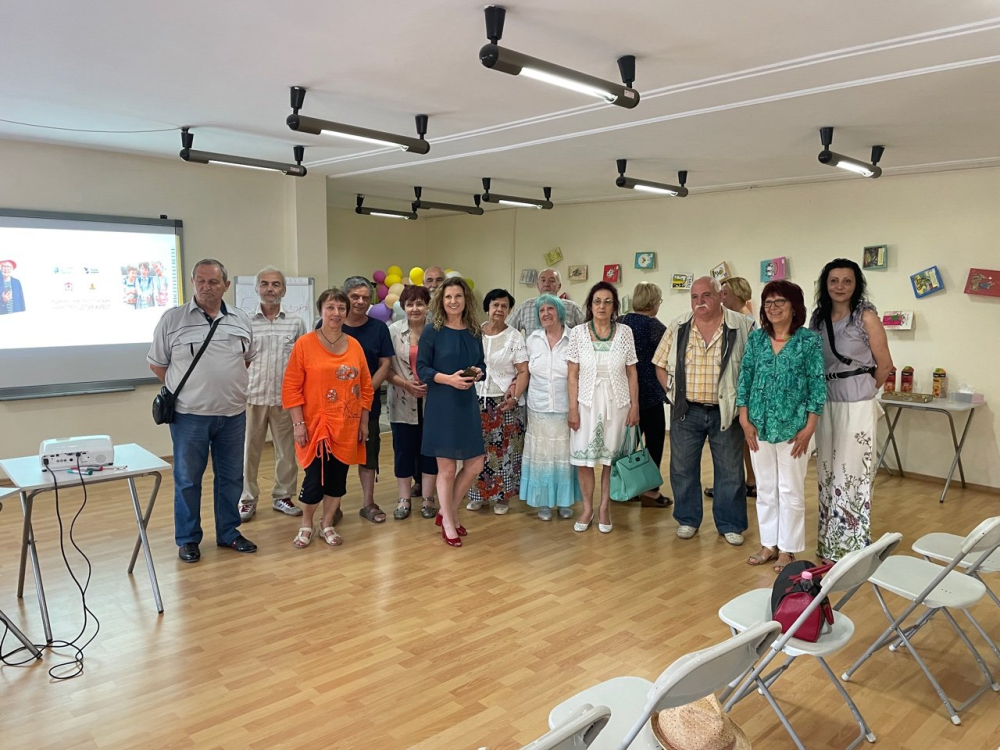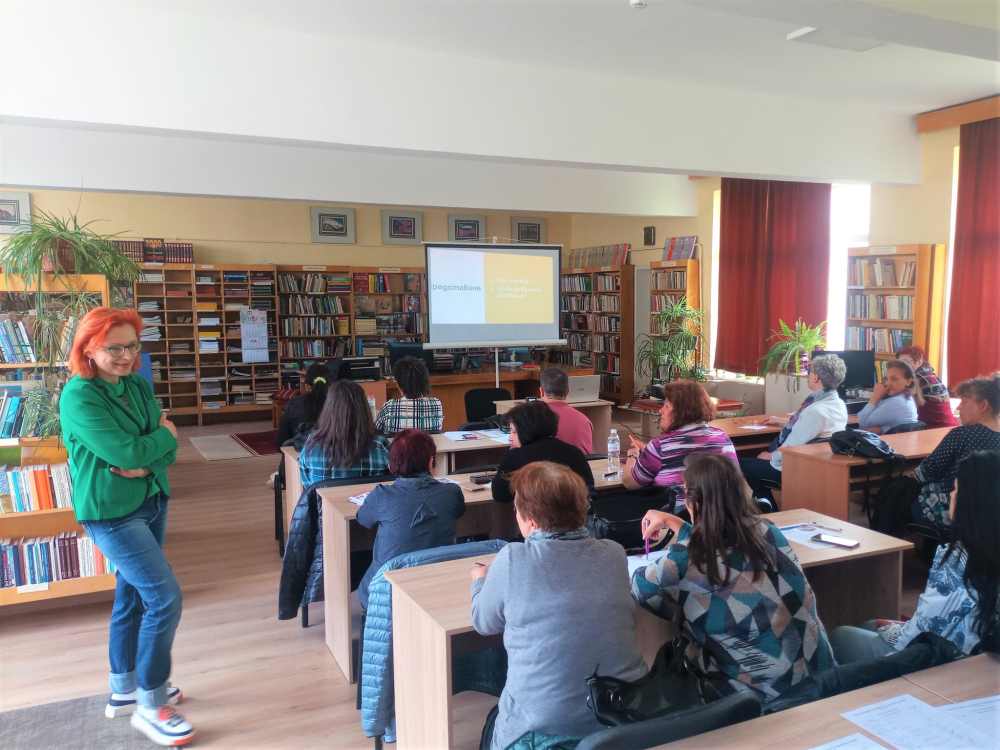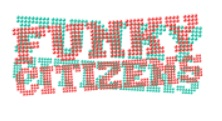More and more elderly people have access to mobile devices in their daily lives and participate in discussions in social media. This new environment allows them to make contacts, share interests and not spend their days in isolation. At the same time, users over 65 are 7 times more likely than young people to share disinformation on social networks, as shown in a research from Princeton University. A number of other studies have proven that the elderly have a greater voter turnout compared with the young, and in recent years, political propaganda and disinformation have been mainly on social networks.
All these facts speak for one thing: elderly people need to be included in the digital world, and by developing their skills, safely and fully participate in social media networks.
It has to be noted that elderly people however are excluded from both formal and non-formal education from learning about the world of digital communications and social networks. While in formal education, the digital literacy and now also the media literacy (although in Bulgaria this is still developing slowly) are part of the school curriculum, the education that people over 65 received was entirely analogue.
Research by the Council of Europe shows that informal initiatives developing media literacy also neglect this age group, with only a negligible percentage of such projects involving the elderly (and mostly focused on the development of their digital skills). However, the knowledge of how to operate with smartphones and computers is only an entrance to the digital world, and managing that space safely and securely requires another set of skills.
Media Literacy for the Elderly. Why is it Important?
 Miroluba Benatova, one of the most popular investigative journalists in Bulgaria, with the participants in training for senior citizens in the regional library of Dobrich. Photo: CML
Miroluba Benatova, one of the most popular investigative journalists in Bulgaria, with the participants in training for senior citizens in the regional library of Dobrich. Photo: CML
For both young and elderly people, participating in the digital world requires skills that relate to the fact that we are now not only consumers of information, but also active creators. The online space is already a social environment for interpersonal contacts and communication. Therefore, media literacy skills as adopted by the Media Literacy Coalition (and also according to Directive (EU) 2018/1808) are aimed at solving these challenges. Briefly, media literacy refers to skills and knowledge that enable people to use media content effectively and safely: to find and critically evaluate media content (including social media and communications content), to create safe and responsible content themselves, to be able to communicate and solve problems in an online environment.
These skills are important for elderly people, which increasingly use social media to connect with each other, to find new friendships, to share their lives, to find solutions to their household or health problems, to participate in political issues etc.
The Traps?
“I received an email from a man claiming he is an American captain of a ship sailing around the world. We started texting each other. I translated everything through Google Translate. He told me he was a 60-year-old widower. I was flattered and, despite my age, continued our communication with hope and dedication. One day he wrote to me that he had been kidnapped in an African country and urgently needed ransom money. Although he claimed he is very rich, he did not have access to his funds at that moment…”
This is the beginning of a real story that a participant aged 65+ years shared during a media literacy training. Fortunately, her story ends on a positive note as she consulted with relatives which immediately alerted her that it was a scam. Many such stories do not end with a happy ending. Another participant shared how she lost $120 after falling into an attractive work-from-home scheme. She only had to pay a fee to cover courier services to the USA. Very often, elderly people also post pictures of their home and their grandchildren. All this data, while innocent at first glance, is like pieces of a puzzle that the Internet fraudsters can easily arrange into a trap.
The elderly (and not only) can easily be misled by the countless anonymous sites or private Facebook groups. For many people, websites are as credible information as any other, with no idea how easily a site can be made to look like a trustworthy and recognizable media. The mass use of interest groups on Facebook for example (patriotic, culinary, gardening, photography) to push propaganda and conspiracies is also difficult to detect by the average user.
Media Literacy Trainings for Seniors
 Velziara Tsoneva, TV presenter and producer in the regional Zagora TV, during a training for senior citizens. Photo: CML
Velziara Tsoneva, TV presenter and producer in the regional Zagora TV, during a training for senior citizens. Photo: CML
Recognizing all these pitfalls, as well as crafting possible strategies for dealing with the Internet harassment, abuse and "trolls", are the basis of trainings for seniors, which the Media Literacy Coalition (MLC) has been implementing for four years across Bulgaria. The training is developed based on the principles of andragogy (principles of adult education). A characteristic of the representatives of the 65+ age group is that, for the training to be effective, it is important to involve their previous experience.
Discussion and sharing experiences are a major part of learning, as well as solving the practical cases. MLC training mainly includes basic skills that are easy to apply in daily participation in social media networks. Currently, it includes several main topics:
How to distinguish reliable from unreliable sources of information?
How to recognize fake profiles on social media?
How to protect yourself from online scams?
What are the risks associated with sharing your personal data online?
What Not to Do?
By January 2024, more than 600 elderly people have gone through the training throughout Bulgaria. A key lesson from our experience shows that discussing confrontational political and social topics in Bulgaria is not a good introduction to the topic. Whether it is the war in Ukraine, the pandemic and vaccines, or Bulgarian politicians, such topics can easily lead to conflict within the group or between the group and the trainer. One of the approaches that some of our trainers take is to present disinformation on a given topic from both perspectives. However, this is difficult to do for all the topics, so we stick to the more universal option and give examples with topics that are related to household, health and social events, and do not have a strong political element to them.
The selection of practical tasks, for example, includes satirical sounding news such as: "EU bans snowmen" or "Every pig should get a toy according to new EU legislation". The main goal is to build critical thinking within the participants, which is a skill they can easily transfer to disinformation related, more serious social and political topics. It is also important that the training follows the pace of the elderly and does not rush through the topics, or that the lecturer doesn’t use terms that will only confuse the participants. For example, currently in the EU’s terminology "fake news" has been replaced by "disinformation", but this word means nothing to most elderly people (and not only). In our approach the principle “Explain it like you are explaining it to your grandmother” is valid.
How Do We Reach Elderly People?
In parallel with the training program for elderly people, MLC has developed a program for trainers and media literacy mentors. More than 200 people have gone through our mentor training so far, mainly employees of regional libraries, cultural centres and community centres. These places are very suitable for creating a trusted relationship with the elderly because in the same locations the extracurricular activities for their grandchildren most often take place. Moreover, many of the seniors’ clubs are situated in those places as well. People who undergo training as mentors become not only ambassadors of the topic of media literacy and its importance, but also help MLC with dedication to organise the trainings and reach out to the elderly. One of the main problems MLC encounters when organising such trainings is that - not only for the elderly, but also for most Bulgarian citizens - the concept of media literacy does not mean anything. "It’s great you are doing literacy training for media, but there aren’t a lot of regional media left in our region” is an answer MLC often gets.
Therefore, communication and advertisement about the trainings should be very clear on what people should expect. MLC’s experience shows that engaging popular media personalities as trainers is a prerequisite for wider participation in training. That is why MLC has developed a program for the training of journalist trainers. A major shortcoming of MLC’s previous approach remains that the program mainly reaches elderly people who are already involved in visits to libraries, community centres, and cultural centres due to family or other reasons. In most cases, these are more active people, who have a greater interest in learning and solving new challenges. However, one large group that is less active and hard to reach is left without aid in the world of social media. Its representatives are easily drawn into various conspiracies and propaganda groups, and often become involuntary "trolls". However, how to reach this group is a question we are still looking for the solution to.
What Is Next?
Engaging elderly people across the country in active, yet safe, digital lives is a key goal of the Media Literacy Coalition. One of the main challenges we face is how to create sustainability and follow-up after the trainings we host for seniors. Although within the framework of the training, the participants are open to a critical review of the content and communication in social media networks, if there is no subsequent involvement of the participants, there is a risk that the trainings result in a short-term effect only. Therefore, MLC is currently exploring opportunities to create long-lasting activities through which elderly people can continue to apply the newly learned media literacy skills in their everyday lives.
Background Image by Matt Bennett via Unsplash
Author: Kristina Hristova, President of Media Literacy Coalition
Want to boost your media literacy skills? Register to our free, self-paced course today!
This article was published in partnership with Funky Citizens

